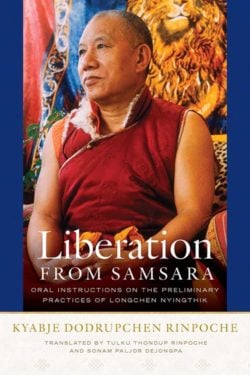Kyabjé Dodrupchen Rinpoché

The fourth Dodrupchen, Thubten Trinlé Palzang, was born in 1927 in the Golok province of Far Eastern Tibet, and was one of the most important masters in the Nyingma and Dzokchen traditions of Tibetan Buddhism. Kyabjé Dodrupchen Rinpoché made frequent visits to the West, sharing important teachings of the Nyingma lineage, the root volumes of Longchen Nyingthik, the essential empowerments of Dzokchen, and many other teachings on how to be liberated from the suffering of samsara by practicing guru yoga. Rinpoché passed into parinirvana on the afternoon of January 25, 2022 in Sikkim, India.
Books, Courses & Podcasts
Liberation from Samsara
This rare teaching by Rinpoché is a uniquely concise volume of the teachings of the path to liberation that is authentic, authoritative, and complete.
In Liberation from Samsara, the Fourth Kyabjé Dodrupchen Rinpoché presents the Longchen Nyingthik preliminary teachings, with a special focus on guru yoga. These teachings, from the innermost secret instruction of Dzogchen, constitute a complete path to enlightenment.
After discussing the ways to turn our mind toward Dharma and the trainings, Rinpoché provides guru yoga instruction as he turns to the main tantric practice: meditations on unifying one’s mind with Guru Rinpoché’s wisdom mind. This rare teaching by Rinpoché, though intentionally succinct to accommodate the needs of contemporary Western practitioners, presents a complete path to enlightenment. It contrasts three different paths to liberation: Shravakayana (the way of the disciple), Pratyekabuddhayana (the way of the self-enlightened buddha), and Mahāyāna (the way of the bodhisattva), which is our way, our boundless intention to seek refuge in order to free all sentient beings from samsaric suffering.

